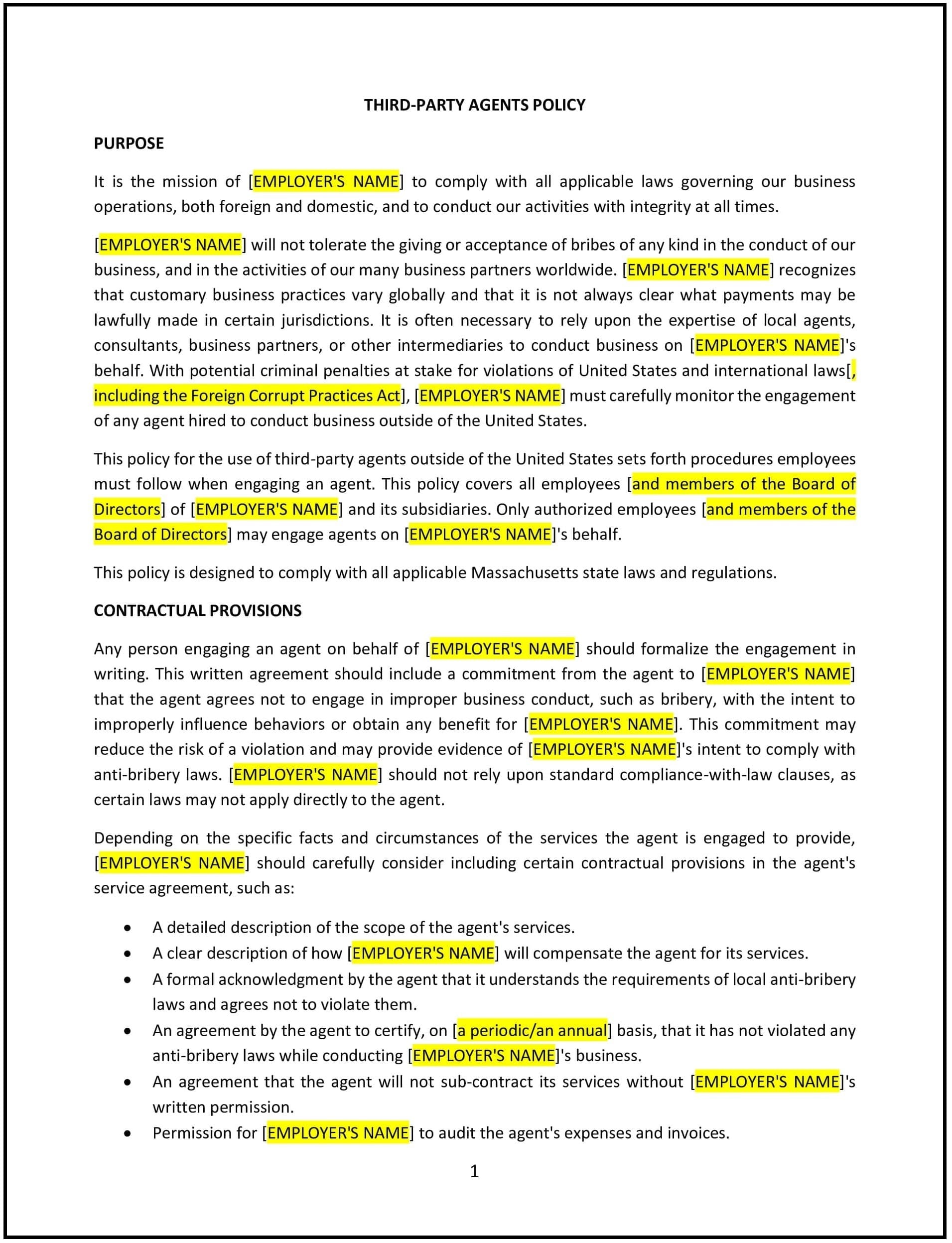Third-party agents in the workplace policy (Massachusetts): Free template
Got contracts to review? While you're here for policies, let Cobrief make contract review effortless—start your free review now.

Customize this template for free
This third-party agents in the workplace policy is designed to help Massachusetts businesses manage the presence and activities of third-party agents, contractors, vendors, and service providers who interact with employees and operate on company premises. The policy outlines expectations for third-party behavior, how they should be integrated into the workplace, and the responsibilities of both the company and the third-party agents. It ensures the safety, security, and professionalism of workplace interactions between employees and third-party agents.
By adopting this policy, businesses can minimize risks, protect their interests, and maintain a respectful work environment for employees while fostering successful relationships with third-party agents.
How to use this third-party agents in the workplace policy (Massachusetts)
- Define third-party agents: Clearly define what constitutes a third-party agent in the context of the policy. This may include contractors, consultants, vendors, temporary workers, or any other external parties who are hired to perform services or assist with business operations on company premises.
- Set expectations for third-party behavior: Outline the expected standards of conduct for third-party agents while they are on company premises. This may include maintaining a professional demeanor, adhering to company safety policies, and respecting employee rights and privacy.
- Address safety and security protocols: Specify the safety and security expectations that apply to third-party agents working on the company’s premises. This could include background checks, requiring third-party agents to follow the company’s security protocols, and restricting access to certain areas of the workplace.
- Manage confidentiality and data protection: Ensure that third-party agents understand and comply with confidentiality and data protection policies. This includes safeguarding sensitive company information, intellectual property, and personal data. The policy should specify that third-party agents must sign confidentiality agreements or non-disclosure agreements (NDAs) if required.
- Specify access and supervision: Define the process for granting third-party agents access to the workplace, including any necessary clearance procedures. The policy should also clarify how third-party agents will be supervised while on company premises to ensure compliance with company policies and regulations.
- Address the use of company resources: Outline any restrictions on the use of company resources, such as equipment, office supplies, or communication systems, by third-party agents. The policy should specify that company resources should be used only for business purposes and not for personal gain.
- Clarify the scope of third-party responsibilities: Specify the scope of responsibilities for third-party agents and make it clear that any work or services performed must align with the terms of their contract or agreement. The policy should highlight that third-party agents are not employees of the company, and their responsibilities are limited to the services agreed upon.
- Ensure compliance with Massachusetts and federal laws: Ensure that the policy complies with Massachusetts state laws and federal regulations regarding third-party agents, workplace safety, non-discrimination, and labor rights.
- Review and update regularly: Periodically review and update the policy to ensure it is compliant with legal requirements and the evolving needs of the company.
Benefits of using this third-party agents in the workplace policy (Massachusetts)
This policy offers several benefits for Massachusetts businesses:
- Enhances workplace safety and security: By clearly outlining expectations for third-party agents, businesses can minimize security risks and ensure that agents are properly supervised while on company premises.
- Promotes professionalism: The policy helps maintain a professional work environment by ensuring that third-party agents act in a way that reflects the company’s values and standards of conduct.
- Protects company interests: The policy helps protect sensitive company information and assets by specifying the responsibilities of third-party agents and ensuring they adhere to confidentiality agreements and security protocols.
- Reduces legal risk: By setting clear guidelines for third-party agents’ conduct and supporting compliance with Massachusetts state laws and federal regulations, businesses reduce the risk of legal disputes or liability related to third-party interactions.
- Improves vendor and contractor relationships: Clearly defining the scope of work and expectations for third-party agents helps foster positive and professional relationships with contractors, consultants, and vendors, improving business operations.
- Supports compliance with labor laws: The policy ensures that third-party agents comply with Massachusetts state labor laws, federal employment regulations, and workplace safety standards.
Tips for using this third-party agents in the workplace policy (Massachusetts)
- Communicate the policy clearly: Ensure that all third-party agents are informed of the company’s expectations regarding behavior, confidentiality, safety, and resource usage. This can be communicated through contracts, onboarding materials, and orientation sessions.
- Conduct background checks: Depending on the nature of the work and the third-party agent’s role, conduct background checks to ensure that the agents meet the company’s standards for security and reliability.
- Monitor third-party activities: Regularly monitor third-party agents’ activities while they are on company premises to ensure compliance with the policy. Address any issues or violations promptly and fairly.
- Establish clear lines of communication: Set up clear communication channels between the company and third-party agents to ensure that any concerns or issues are addressed quickly. Regular check-ins can help maintain effective working relationships.
- Require confidentiality agreements: If necessary, ensure that third-party agents sign confidentiality agreements or NDAs to protect sensitive company data and intellectual property.
- Review and update regularly: Periodically review the policy to ensure it is compliant with Massachusetts state laws, federal regulations, and any changes in the company’s approach to working with third-party agents.